|
Dr. Brian Levine is a senior scientist at the Rotman Research Institute at Baycrest Health Sciences, professor in the Departments of Psychology and Medicine (Neurology), University of Toronto, and a clinical neuropsychologist. He is interested in the function and dysfunction of large-scale neural systems as expressed in complex human behaviours, including episodic and autobiographical memory and executive functioning. He studies syndromes seen in patients with traumatic brain injury, focal brain lesions due to strokes and tumors, dementia, and psychiatric disorders, as well as healthy younger and older adults. His research is focused on developing empirically supported measures of naturalistic mnemonic and executive processes and using these to inform both theory and clinical practice. Dr. Levine uses novel assessment techniques, coupled with multimodal neuroimaging (structural and functional MRI, EEG, and MEG) in his research.
|
For a full list of publications, see:
ResearcherID/Publons Academia.edu ORCID Google Scholar Research Gate Scopus Preprints can be accessed on the Open Science Framework: osf.io/5s9ch |
News
Welcoming new lab members Dr. Krista Mitchnick (NSERC Postdoctoral Fellow) and Zoé Labonté (summer student).
Congratulations to Dr. Carina Fan, who successfully defended her Ph.D. thesis: The Structure and Function of Autobiographical Memory: Spatial Cognition, Aging, and Individual Differences!
Dr. Brian Levine spoke at the PowerPlant Gallery's Sunday Scene about Brenda Draney's paintings and memory. Read the remarks here.
Digital Goal Management Training™ now offered on Telus Health's AbilitiCBT platform in English and in French!
Read the press release here.
Congratulations to Drs. Moriah Sokolowski and Vess Stamenova on their appointments as Assistant Professors of Psychology at Toronto Metropolitan University!
Recent publications
Effects of healthy and neuropathological aging on autobiographical memory: A meta-analysis of studies using the Autobiographical Interview. The Journals of Gerontology, Series B, Psychological and Social Sciences.
OSF preprint
Congratulations Stephanie Simpson and Mona Eskandaripour!
What about "space" is important for episodic memory? WIREs Cognitive Science
Congratulations Carina Fan and Dr. Moriah Sokolowski! (and Sadie Levine who did the cover illustration)
Common neural substrates of diverse neurodevelopmental disorders. Brain.
Congratulations Dr. Moriah Sokolowski!
Visualization of Latent Components Assessed in O*Net Occupations (VOLCANO): A robust method for standardized conversion of occupational labels to ratio format. Behavior Research Methods.
Congratulations Drs. Ju-Chi Yu and Moriah Sokolowski!
Autobiographical Memory. Handbook of Human Memory.
Congratulations Carina Fan, Stephanie Simpson, and Dr. Moriah Sokolowski!
The truth Is out there: Accuracy in recall of verifiable real-world events, Psychological Science
Congratulations Dr. Nick Diamond (with Dr. Mike Armson)!
Linking detail to temporal structure in naturalistic-event recall, Psychological Science
Congratulations Dr. Nick Diamond!
Read about our research on Severely Deficient Autobiographical Memory (SDAM) in Wired.
Interested in participating in research?
See our survey at MemoryInventory.com
Congratulations to Dr. Carina Fan, who successfully defended her Ph.D. thesis: The Structure and Function of Autobiographical Memory: Spatial Cognition, Aging, and Individual Differences!
Dr. Brian Levine spoke at the PowerPlant Gallery's Sunday Scene about Brenda Draney's paintings and memory. Read the remarks here.
Digital Goal Management Training™ now offered on Telus Health's AbilitiCBT platform in English and in French!
Read the press release here.
Congratulations to Drs. Moriah Sokolowski and Vess Stamenova on their appointments as Assistant Professors of Psychology at Toronto Metropolitan University!
Recent publications
Effects of healthy and neuropathological aging on autobiographical memory: A meta-analysis of studies using the Autobiographical Interview. The Journals of Gerontology, Series B, Psychological and Social Sciences.
OSF preprint
Congratulations Stephanie Simpson and Mona Eskandaripour!
What about "space" is important for episodic memory? WIREs Cognitive Science
Congratulations Carina Fan and Dr. Moriah Sokolowski! (and Sadie Levine who did the cover illustration)
Common neural substrates of diverse neurodevelopmental disorders. Brain.
Congratulations Dr. Moriah Sokolowski!
Visualization of Latent Components Assessed in O*Net Occupations (VOLCANO): A robust method for standardized conversion of occupational labels to ratio format. Behavior Research Methods.
Congratulations Drs. Ju-Chi Yu and Moriah Sokolowski!
Autobiographical Memory. Handbook of Human Memory.
Congratulations Carina Fan, Stephanie Simpson, and Dr. Moriah Sokolowski!
The truth Is out there: Accuracy in recall of verifiable real-world events, Psychological Science
Congratulations Dr. Nick Diamond (with Dr. Mike Armson)!
Linking detail to temporal structure in naturalistic-event recall, Psychological Science
Congratulations Dr. Nick Diamond!
Read about our research on Severely Deficient Autobiographical Memory (SDAM) in Wired.
Interested in participating in research?
See our survey at MemoryInventory.com
|
Twitter - https://twitter.com/briantlevine
|
|
This research is generously supported by:





